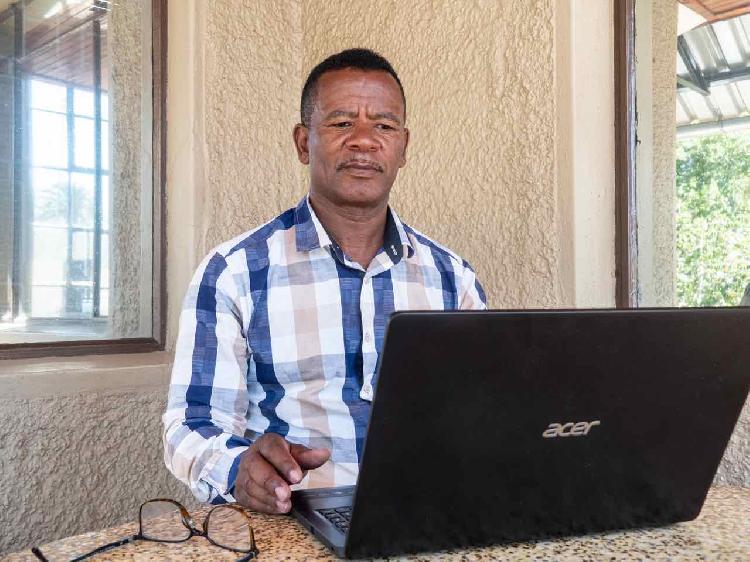Africa-Press – Namibia. LUCKY Richter will be remembered by many football fans as that stocky forward who used to bamboozle opposition defenders with his superb dribbling skills and trickery with the ball.
The former Black Africa winger is also a rare football breed who represented Namibia at all levels. Known as ‘Bazooka’ during his illustrious playing career, Richter announced his arrival on the local football scene during the 1986 John Player Special Cup competition, when he netted a hat-trick in the semi-final against African Stars FC to carry Black Africa FC into the final. Richter, who holds the distinction of playing for three generations of Black Africa, also netted a brace in the final against Blue Waters for an emphatic 5-2 victory which saw him walking away with the prestigious Man of the Series award. The slippery winger was also an illustrious coach for all the national age group teams, including the Brave Warriors, whom he led to an emphatic unequalled 8-2 drubbing of Benin during a World Cup qualifier in Windhoek in 2000. In addition, the Windhoek-born ball-juggler is also credited for shaping the careers of players likes Rudi Louw, Riaan Cloete, Heini Isaaks, Bradley Asprilla Wermann, Ellington Tjirimuje, Khumalo Gowaseb, Henrico Afrikaner and current national under-20 team coach James Britz, from the age of seven through his soccer school. The Namibian Sport caught up with Richter, a matriculant of JA Nel Secondary School at Keetmanshoop, to find out what he has been up to since retiring from active football. Said Richter: “I was the north-eastern regional manager of MTC Namibia for 10 years after my retirement from the game. I was based at Otjiwarongo and I was also covering a vast area including towns of Okahandja, Otavi, Grootfontein, Tsumkwe, Rundu, Nkurenkuru and Divundu in the two Kavango regions. “I was basically the point of contact for the company in the region. My duties also entailed the marketing aspect of business and dealer control. I oversaw that what we gave was used for its purpose and I had to keep trends with competition.” He added that his team was also required to do feasibility studies and research on possible markets to penetrate in his area while he was also responsible for the sales department. Richter has since started a new career as a consultant on infrastructure projects of commendable size for both the government and the private sector. “After 2011 I also joined the petroleum selling business both in the upstream, as well as in the downstream sector. We sell petroleum products both for bunkering, which is upstream, and selling in bulk to petrol stations, which is downstream,” he explained. A normal day for Richter, who is now based in Windhoek, starts with meetings to keep trend with what they do and what needs to be done. Asked about the challenges he is facing in his new job, the dribbling wizard, who also had a brief stint with Bloemfontein Celtic in the South African professional league, pointed out that the bureaucracy surrounding government projects remains a stumbling block. “Business is good and it is starting to pick up a little bit after the government opened up the economy after the recent lockdown due to the devastating Coronavirus. However, things can only improve a lot more if government moves faster with the paperwork. “I can however not praise the government enough for the peaceful environment prevailing in the country which is very conducive for business but bureaucracy is a problem,” he said. He said things could only get better if the paperwork flows a little faster because as things stand at the moment – they don’t come to the party. “The prospective company registration and licencing takes longer than it should be. It is shame that the moratorium in the government offices keeps business away and investment counteragent. Otherwise, Namibia is a safe heaven for investment.” he said. The former Young Beauties FC star, seems to be a very busy man because he also boasts a career as a Boerbok stud goat breeder. “I am a very committed and proud Boerbok stud goat breeder. I am very passionate about farming. Of course the drought was there but we are surviving. The Boerbok survives on very little food as long as they are not far from water and other basic stuff. “I am farming in the Grootfontein area. I am fortunate to be in the position that I am in, being my own boss, because I can go and come like I want. As things stand, I can even go to the farm for three days and the system that we have set up allows me to go to the farm,” he enthused. Richter is also the proud father of six children. His oldest son is a businessman in England and his second born son is a pastor in the United States. His third born son is medical technologist and he works as microbiologist while his fourth born is five years old. His oldest born daughter lives with her mother in Oudtshoorn, South Africa. The second born daughter and his youngest child is four years old. Richter said his third-born son played a little bit of football “but with the amateur set-up of Namibian football, I told him to concentrate more on his education.” But does he live a fulfilling life and is he happy how his life panned out after football. “Material things are nothing if you don’t live your life with God taking the centre stage. You can have everything which you wish for but it is very imperative that you live your life the way the Almighty Father has prescribed in his 10 Commandments. “One can never be comfortable before you know God. I feel complete and my health is tip top. My best asset is my health and I still feel I could still register with the club and start playing football again. Today’s players have the talent but lack the passion,” he said. Richter also expressed dissatisfaction with the way the sports infrastructure is distributed in communities around the country. “Over 30 years after independence the municipalities have done absolutely nothing to empower the sports clubs from the townships with land to build their own sports grounds. It is so unfair that former predominantly white clubs continue to have their own infrastructure. “How they have obtained that infrastructure only they know but they can’t claim to have worked for that because they were never near successful than the likes of African Stars, Black Africa, Blue Waters, Chief Santos and Orlando Pirates,” he said. Richter, who completed his masters degree in business administration recently, claims that the privileges those teams enjoyed during the old dispensation – obviously played a major role in securing them their sports grounds, asking why our government can’t do the same for black teams. Said Richter: “Black teams were denied having their own grounds with their club houses and all that we are crying for is that our black government should give the black clubs a piece of land where they can build their own infrastructure as well. “The unfair situation has led to black clubs not being able to have their own development teams down the various age groups meaning that I can have a child today but he will end up joining the academy of DTS, Ramblers or SKW who don’t even have teams in the premier league.” With the envisaged professional league, one of the requirements by Fifa for club licencing requires all the teams to have their own infrastructure and a youth development structure. Asked what he misses the most from his playing days, Richter, who named former Orlando Pirates hard man Salathiel ‘Stimela’ Ndjao as his toughest opponent, said he misses playing in the championship, especially the cup games in which BA reigned supreme. “We were such a disciplined unit and we were gifted with good footballers who knew how to win. In fact, winning and success was in the DNA of each and every Black Africa player. We had a sense of healthy competition among the players for places on the team,” he said. Richter is a proud holder of the NFA C and B coaching licences. He also did a football administration, a basic coaching licence, an intermediate and two high level coaching courses through the Confederation of African Football (CAF). “The reason I had two high level courses is that I got 98% in the first course and the course requires a 100% pass which I obtained in the second high level course. If you get 100% you get invited by CAF to do the elite course, which is only accorded to the top coaches in Africa,” Richter, who also completed a sports medicine and psychology courses in Germany, noted. He pointed out that nowadays the players are only passionate about salaries and that players from his generation produced their best without a salary. Richter, who is a qualified youth coach instructor who can issue licences to successful candidates, also helped draft Black Africa’s first ever constitution recently.






